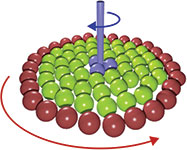The nanoclutch – transmission of torque at the molecular level
February 2016
News
A model microscopic system to demonstrate the transmission of torque in the presence of thermal fluctuations – necessary for the creation of a tiny clutch operating at the nanoscale – has been assembled at the University of Bristol as part of an international collaboration.
When driving a car, the clutch mechanically carries the torque produced by the engine to the chassis of the vehicle – a coupling that has long been tested and optimised in such macroscopic machines, giving us highly efficient engines. For microscopic machines, however, developing a clutch which can operate at the nanoscale is much more challenging because at this level different physics need to be considered. Thermal fluctuations play an increasingly dominant role as a device is miniaturised, leading to increased dissipation of energy and the need to develop new design principles.
Principle of operation of the nanoclutch: red spheres rotate clockwise and an opposing torque is applied to a central axle.
In the model microscopic system developed by scientists from Bristol, Düsseldorf, Mainz, Princeton and Santa Barbara, a ring of colloidal particles is localised in optical tweezers and automatically translated on a circular path, transferring a rotational motion to an assembly of identical colloids confined to the interior region.
Dr Paddy Royall of the University of Bristol said: “This device looks a lot like a washing machine, but the dimensions are tiny. Through optical manipulation the particle ring can be squeezed at will, altering the coupling between the driven and loaded parts of the assembly and providing a clutch-like operation mode.”
Colloidal suspensions fall into the category of materials known as soft matter and the softness of the rotational device is shown to lead to new transmission phenomena not observed in macroscopic machines. “Exploiting the softness of nanomaterials gives us additional and unprecedented control mechanisms which may be employed when designing microscopic machines,” Dr Royall explained.
In addition to the experiments performed at the University of Bristol, physicists at the University of Düsseldorf have developed model computer simulations to further investigate torque coupling at the nanoscale. This enables the measurement of nanomachine efficiency, which is small but can be optimised through careful control of the system parameters.
The researchers have identified three different transmission regimes: a solid-like scenario which transmits torque much like a macroscopic gear; a liquid-like scenario in which much of the energy input is lost to friction and an intermediate slipping scenario unique to soft materials which combines aspects of the solid-like and liquid-like behaviours.
“A basic understanding of the coupling process will give us insight into the construction of nanomachines, in which torque transfer is absolutely essential,” said Professor Hartmut Loewen of the University of Düsseldorf.
The research is published in Nature Physics.
For more information contact Paddy Royall, University of Bristol, +44 117 928 7668, [email protected]
Further reading:
4Sight OT Automation achieves prestigious AVEVA Endorsed Partner status
News
4Sight OT Automation, a leading industrial software solutions provider, has achieved Endorsed Partner status within the AVEVA Partner Network.
Read more...
Schneider Electric announces 2023 Global Alliance Partner Programme award winners
Schneider Electric South Africa
News
Schneider Electric has announced the winners of the 2023 Global Alliance Excellence Awards. Throughout 2023, Schneider Electric’s Alliance Partners supported customers in the digitalisation of industrial automation, delivering value with innovative initiatives, solutions and services.
Read more...
Custom containerised lubrication dispensing system
News
Bosch Rexroth Africa recently supplied and installed a customised environmentally friendly and dust-proof lubrication dispensing system for a leading earth-moving equipment supplier.
Read more...
Siemens to acquire industrial drive technology business of ebm-papst
Siemens South Africa
News
Siemens has signed an agreement to acquire the industrial drive technology business of ebm-papst. The business includes intelligent, integrated mechatronic systems in the protective extra-low voltage range and innovative motion control systems.
Read more...
Bearings International fosters a segment strategy
Bearings International
News
Bearings International has a segment approach to the market, which places an intentional focus on key industries in South and sub-Saharan Africa in a bid to optimise operations, enhance uptime, and drive business sustainability and increased profitability outcomes for customers.
Read more...
Local robotics team’s journey to the world stage
News
In the heart of Cape Town, a group of young visionaries aged 12 to 17 is making waves in the world of robotics. Known as Texpand, this team from Pinelands has not only dominated the First Tech Challenge (FTC) in South Africa, but has also earned international acclaim for its innovative approach to engineering and problem solving.
Read more...
RS Group expands by 10 000 products
RS South Africa
News
RS South Africa has announced its Better World Claims Based Framework, enabling customers to select verified sustainable product alternatives. This provides suppliers with a standardised framework to accelerate the development and manufacture of more sustainable and responsible products.
Read more...
IRP 2023 could reset SA’s social and economic problems
News
ACTOM recently held a webinar on the ‘Draft IRP2023 Impact on the Manufacturing Sector’. South Africa’s Draft Integrated Resource Plan 2023 is a key document that outlines a comprehensive strategy for addressing the country’s energy security challenges, while also setting out its transition to a diversified energy mix, including renewables.
Read more...
Young scientists to showcase innovative research
News
Innovative South African research which includes a cost-effective triage test for real-time detection of TB and a nature-based technology that brings about environmental remediation, will be showcased at this year’s International Festival of Engineering, Science and Technology in Tunisia.
Read more...
Moog takes a leadership position in lunar exploration
News
NASA is planning for a sustained human presence on the Moon, and resources such as water could eventually be harnessed from the lunar surface instead of being transported from Earth, and it has turned to industry to find ways to excavate and transport that icy regolith.
Read more...

